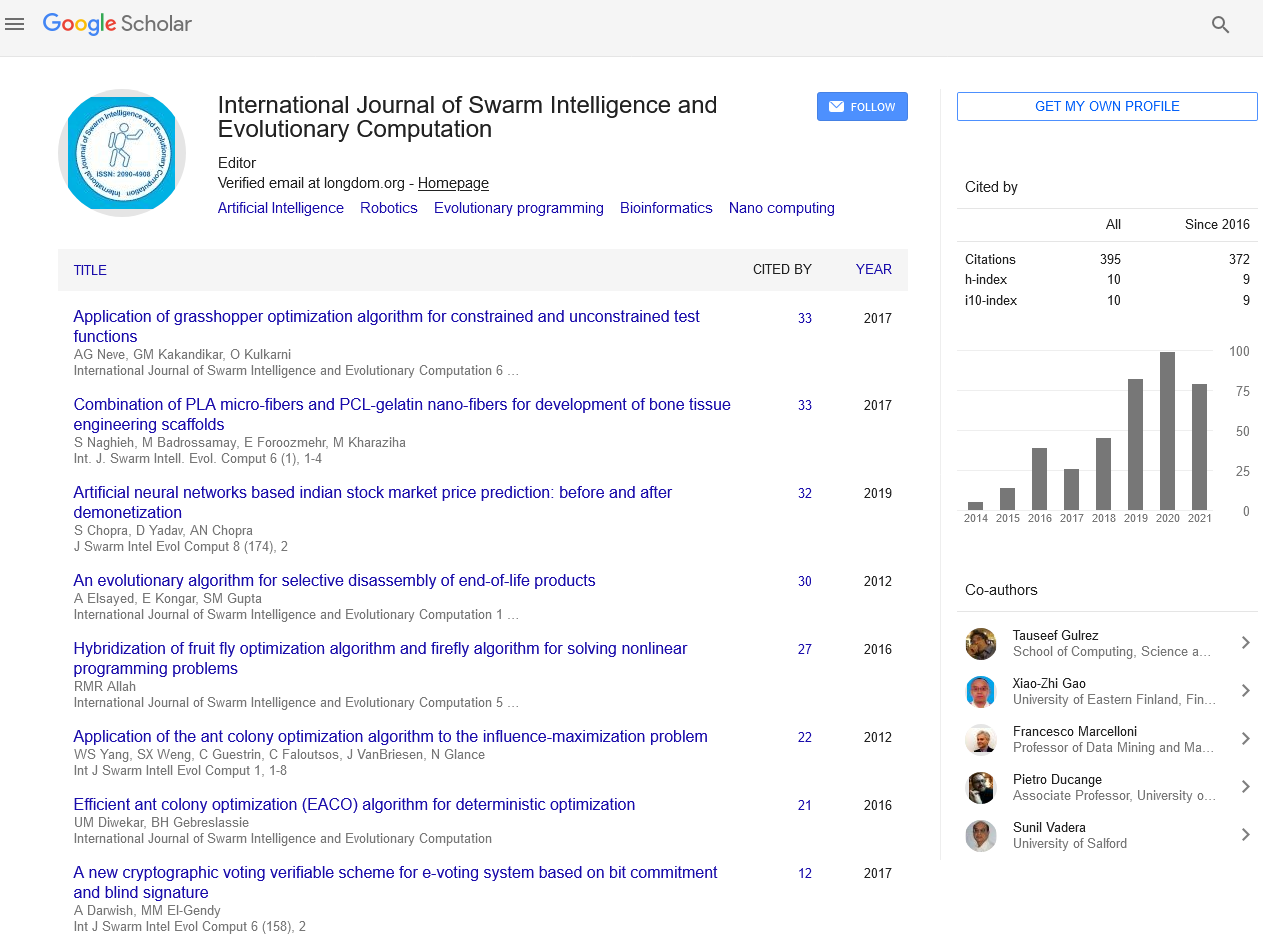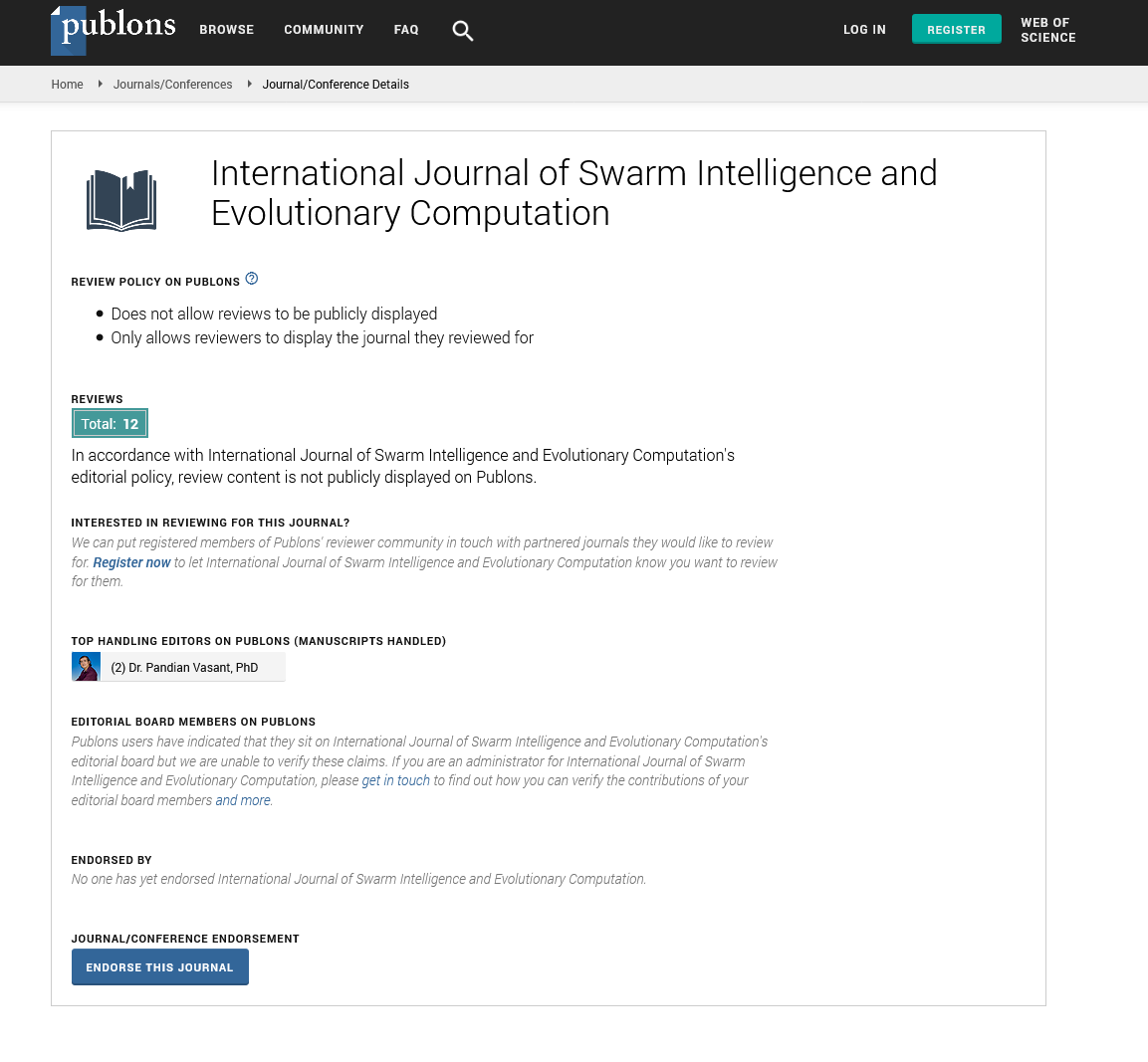Indexed In
- Genamics JournalSeek
- RefSeek
- Hamdard University
- EBSCO A-Z
- OCLC- WorldCat
- Publons
- Euro Pub
- Google Scholar
Useful Links
Share This Page
Journal Flyer

Open Access Journals
- Agri and Aquaculture
- Biochemistry
- Bioinformatics & Systems Biology
- Business & Management
- Chemistry
- Clinical Sciences
- Engineering
- Food & Nutrition
- General Science
- Genetics & Molecular Biology
- Immunology & Microbiology
- Medical Sciences
- Neuroscience & Psychology
- Nursing & Health Care
- Pharmaceutical Sciences
Opinion Article - (2022) Volume 11, Issue 4
Machine Learning Based Data Analytics for Healthcare System
Noothan Thakul*Received: 30-Mar-2022, Manuscript No. SIEC-22-16628; Editor assigned: 01-Apr-2022, Pre QC No. SIEC-22-16628(PQ); Reviewed: 15-Apr-2022, QC No. SIEC-22-16628; Revised: 22-Apr-2022, Manuscript No. SIEC-22-16628(R); Published: 02-May-2022, DOI: 10.35248/2090-4908.22.11.250
Description
Machine Learning (ML) is a field of study related to understanding and creating ways to learn. It is considered part of artificial intelligence. Machine learning algorithms build models based on sample data called training data, making predictions and decisions even if they are not explicitly programmed. Machine learning algorithms are used in a variety of applications where it is difficult or impossible to develop traditional algorithms to perform the required tasks, such as medicine, email filtering, speech recognition, and computer vision.
A subset of machine learning is closely related to computational statistics that focus on making predictions using computers. However, not all machine learning is statistical learning. Mathematical optimization research provides methods, theories, and application domains in the field of machine learning. Data mining is a related research area focused on exploratory data analysis by unsupervised learning. Some implementations of machine learning use data and neural networks in a way that mimics the workings of the biological brain. In its application across business problems, machine learning is also referred to as predictive analytics..
The main focus of machine learning is to develop computer programs that can access and use the data for learning purposes. This is a machine feature that makes data-driven systems more powerful by using statistical methods and advanced algorithms to make more powerful predictions and replace rule-based systems. The main component of machine learning is data. This is the backbone of every model. According to the data, you need to choose an algorithm based on the problem to get a more accurate prediction. Machine learning can be used in many areas such as finance, retail, healthcare, social data, etc.
Health care data
Health data is related to the health of an individual patient or population. This information is collected from various Health Information Systems (HIS) and other technical tools used by medical professionals, insurance companies, and government agencies. We can see trends related to location, socioeconomic status, race, and predisposition, as well as the big picture of individual patients. The information collected can be divided into specific datasets for analysis.
There are a variety of tools and systems used to collect, store, share and analyze health data gathered through various means. These tools include:
• Electronic Health Records (EHRs)
• Personal Health Records (PHRs)
• Electronic Prescription Services (E-prescribing)
• Patient Portals
• Master Patient Indexes (MPI)
• Health-Related Smart Phone Apps and more
Due to digital data collection, more and more health data needs to be analyzed every second. With the proliferation of electronic records, applications, and other electronic means of data collection and storage, large amounts of data are being collected in real time. These datasets are so complex that traditional processing software and storage options cannot be used. Cloud storage is a necessity when dealing with "big data". Cloud storage is designed for security and is absolutely necessary when processing sensitive patient data. It is also very cost-effective and helps reduce rising medical costs.
Importance of health care data analytics
The Healthcare industry is one of the most challenging industries when it comes to data analytics and management. The massive influx of complex data in the healthcare industry makes it almost intimidating for organizations that don’t have the right data analytics and management tools to handle it. This also results in the failure of such organizations to squeeze out meaningful insights from the data, which otherwise can be used to improve the quality of healthcare offered to patients, as well as, to increase the efficiency of the organization.
The healthcare data may just seem like a jumble of numbers and words that is until this data is converted into meaningful information by using advanced data analytics tools. According to one survey, over 90% of healthcare organizations strongly agreed to the growing influence of data analytics for their organizations in the next few years. This shows that just like every other industry, data analytics is slowly but surely starting to influence the healthcare industry for the good, transforming not just the clinical and operational side of the practice but also the administrative and financial aspects of the healthcare industry.
Citation: Thakul N (2022) Machine Learning Based Data Analytics for Healthcare System. Int J Swarm Evol Comput. 11:250
Copyright: © 2022 Thakul N. This is an open-access article distributed under the terms of the Creative Commons Attribution License, which permits unrestricted use, distribution, and reproduction in any medium, provided the original author and source are credited.


